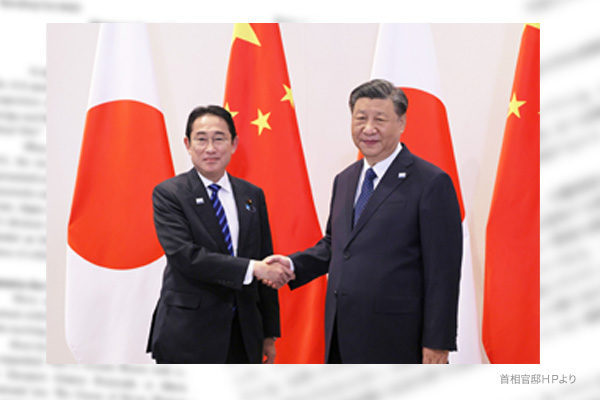At their first meeting in a year, the top Japanese and Chinese leaders, though reaffirming the comprehensive promotion of a “mutually beneficial relationship based on common strategic interests,” failed to resolve key outstanding issues such as China’s detention of Japanese nationals, Chinese buoys in Japan’s exclusive economic zone around the Senkaku Islands, and China’s total embargo of Japanese seafood.
According to the Nikkei Shimbun newspaper, at a reception held in Beijing in October, Japanese Ambassador to China Hideo Tarumi, who had coined the concept of a “mutually beneficial relationship based on common strategic interests,” described the concept as “not only focusing on specific bilateral issues but also tenaciously enhancing bilateral communications to stabilize Japan-China relations for mutual strategic interests, even if there are various outstanding issues.” Chinese Foreign Minister Wang Yi, who was also at the reception, reportedly expressed his consent to and admiration for what the ambassador said.
While it is important for the Japanese and Chinese leaders to reaffirm the “mutually beneficial relationship based on common strategic interests” and continue dialogue, specific bilateral issues should not be left unattended. The rescue of Japanese nationals detained in China is a highest-priority issue for Japan to address as a nation. No matter how much Prime Minister Fumio Kishida “conveyed Japan’s positions on all the outstanding issues” (as explained by an aide to Kishida) to Chinese President Xi Jinping, the Chinese leader would not be moved. Because Japan has no countermeasures to Chinese actions.
Enact an anti-espionage law
At least 17 Japanese nationals have been detained in China since an anti-espionage law was implemented in 2014 under the Xi Jinping leadership. Five of them have not been released, including a male employee of Astellas Pharma who was officially arrested in October this year. In July, China put into effect a revised anti-espionage law to strengthen investigative powers.
Many countries, including the United States, have their own anti-espionage laws and have taken advantage of such laws to lead China to release their compatriots in exchange for Chinese spies detained in those countries. However, Japan cannot take such measures as it has no anti-espionage law.
When Japan Innovation Party lawmaker Shigefumi Matsuzawa called for Japan’s enactment of an anti-espionage law at the House of Councillors Foreign Affairs and Defense Committee on November 9, Foreign Minister Yoko Kamikawa only said, “the matter should be carefully examined from multidirectional points of view.” Japan’s ruling and opposition parties should work to enact an anti-espionage law at an early date if only to prompt China to release Japanese detainees as soon as possible.
Do not depend on communications alone
The same thing can be said about the Chinese embargo of Japanese seafood and Chinese buoys’ presence in the Japanese EEZ. These issues will not be resolved through bilateral communications alone.
While this year marks the 45th anniversary of the Treaty of Peace and Friendship between Japan and China, Japan should keep in mind that China today is not the China of 45 years ago.
Takashi Arimoto is a Planning Committee member at the Japan Institute for National Fundamentals and publisher of Monthly Magazine SEIRON at the Sankei Shimbun newspaper.


